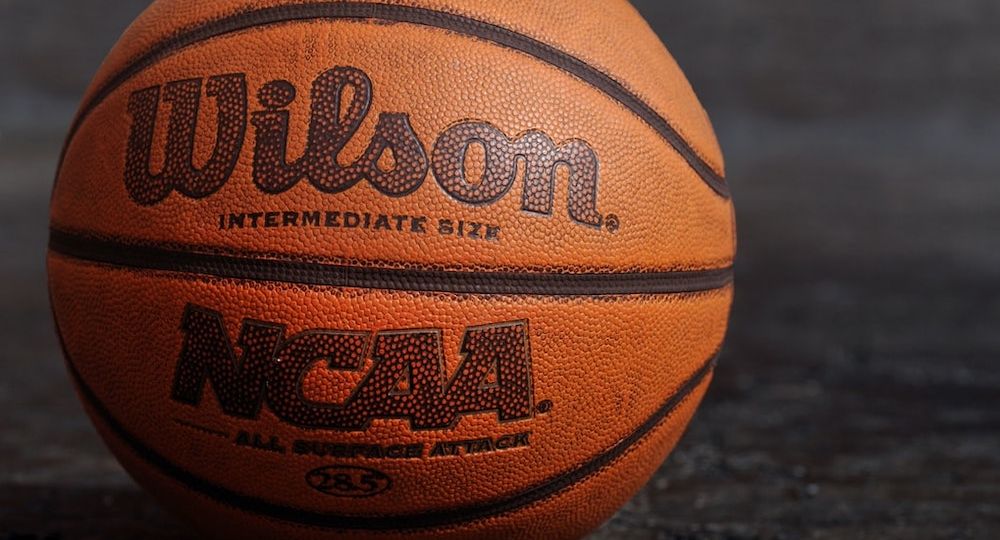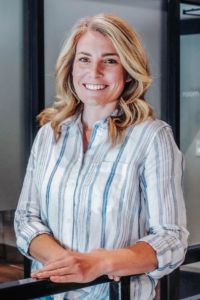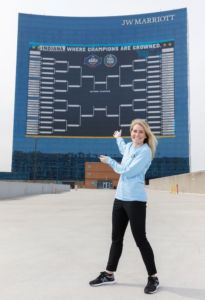
This story was created in partnership with Indiana Sports Corp.
Whether you’re a college hoops fan or not, there’s no denying that this year’s NCAA March Madness basketball tournament brought a much-needed sense of excitement and revitalization back to downtown Indianapolis. While a typical March Madness event takes more than a year to plan and encompasses several basketball arenas and multiple cities, this year’s tournament was centered in Indianapolis—and the whole shebang was planned and executed in about three months. To add to the monumental stress, there was the unprecedented COVID-19 virus and its umpteen implications to worry about, so nearly every aspect of the event had to be retooled to ensure that health and safety were paramount.
On paper it might have looked like an insurmountable feat, but thanks to the teamwork, dedication and ingenuity of a team of hardworking professionals, the seemingly impossible was pulled off, and a thrilling basketball tourney captivated audiences worldwide.
An especially noteworthy aspect of the tournament was the fact that several women in prominent roles within the sports world and the Indianapolis community came together to make it such a success. In particular, we’re putting the spotlight on four amazing women from Indiana Sports Corp—a not-for-profit organization founded in 1979 that has hosted more than 450 events in Central Indiana—that were integral parts of making this year’s March Madness and Final Four so impactful.

Brett Kramer is the Director of Public Relations for Indiana Sports Corp, and during this year’s tournament she was responsible for overseeing public relations and media efforts, as well as managing the social media accounts of both the Final Four and Indiana Sports Corp. Kramer oversaw all six basketball venues to make sure that media relations were running smoothly. In short, she was really busy. “My job was taking care of the media and making sure that they had a good experience, and to really put Indy on a national and international scale when it came to pitching stories,” she said, adding, “I didn’t want anyone to leave saying, ‘Man, I wish they would have told our story more,’ so it was my responsibility to make sure those stories were told.”
During her time at the tournament, Kramer was hit with the realization that she was the only woman to hold her position in at least 10 years. “I am really proud of the fact that I was one of the first female local media coordinators since 2011. There is a random piece of signage that every media coordinator signs and passes along at the tournament, and I was looking at it, and there were no females on the sign. That was a big point of pride for me, and also—talk about pressure. I think we are still battling a bit of a stigma of women in sports, and what was so neat is that we had a lot of powerful females putting on this event,” Kramer said.

One of the powerful women Kramer was referring to is Sarah Myer, the Senior Director of Marketing and Communications for Indiana Sports Corp. “When we were awarded the Final Four, my role was to help get the event information out to the public so that people knew, whether they had a ticket or not, that they could be a part of the event,” Myer explained. “This year we were in a constant planning and re-planning mode to see how we could still safely engage the community, but this wasn’t just a time to engage visitors, it was also an opportunity to re-engage residents, because a lot of people hadn’t been downtown in quite some time,” she said.
Myer was impressed by the teamwork shown by all the women who pulled together and collaborated throughout the event. “There are several women making things happen here in sports in Indianapolis, and during March Madness it was such a great honor to serve with some of them and bring other young women aboard as part of the process and let them see what’s possible. I think it’s important for other women to see that there are women in finance and marketing and event planning roles that are succeeding,” she said. Myer offers these tips for women who are hoping to break into a career in sports: “If you are a young woman who is interested in this field, you have to first accept that it is a lot of hard work, and try to go above and beyond as much as possible. My advice to young women who are interested in a career in sports is always to show up and step up.”

One woman who wasn’t afraid to step up during March Madness was Ashleigh E. Newbold, the Director of Events for Indiana Sports Corp. Her many roles included recruiting volunteers to help lead teams into the venues and assist at the convention center, as well as organizing the medical team in coordination with Ascension St. Vincent Sports Performance, and working with the “Indy Host Program” to help the basketball teams get whatever they needed outside of their controlled environment.
Newbold explained that through the Indy Host Program, teams and coaches could call in for items like snacks or toothbrushes, or anything else they’d forgotten, and the program team would work to fulfill the request. As for what some of the most interesting items requested were, Newbold shared: “There were lots of things that came up, but someone needed a ukulele, so we found a loaner that they could use; I heard that they might have been recording their fight song for CBS/Turner with it. We had some other people that wanted to purchase local foods, like St. Elmo’s sauce and seasoning, and of course, there were a lot of requests for disinfectant.”
RELATED: SPORTS AND THE ARTS: AN INDIANAPOLIS LOVE STORY
What some people may not realize is that it was not just the basketball teams, coaches, and trainers who were quarantined in hotels in downtown Indianapolis; More than 2,000 people were part of the controlled environment for at least some portion of time. Newbold lived for 14 days in a hotel room, working with event staff on the inside and helping the NCAA during the tournament. “It was rewarding, but I definitely missed being able to come home to see my husband—and my dog,” she said.

Another woman who found herself in the controlled environment was Shannon Sullivan, the Director of Statewide Initiatives and Events for Indiana Sports Corp. “As the scope of March Madness shifted, some of my original roles were no longer needed, but this allowed me to be available to be living and working in the controlled environment. I was part of the team that managed the meal program for the 120-plus staff members, including the NCAA basketball staff and the photographers. They all needed to be fed, so our team coordinated and worked with more than 50 local restaurants for lunch and dinner, every day from March 12th until April 5th,” Sullivan explained.
Sullivan worked closely with Newbold and another amazing woman, Susie Townsend of Visit Indy, on the meal program, and she was also part of a team that helped provide entertainment for the student athletes while they were sequestered. “I was able to support some of the student athlete experience pieces, like coordinating team photos in front of the giant bracket at the JW Marriott, and a group of us also took turns managing shifts at Victory Field, so the teams and staff could get outside and run, walk, and play pickleball or cornhole and just get a chance to relax outside.”
 Overall, Sullivan realized that her experience living and working inside of a hotel for days on end was probably “a once in a lifetime situation,” and she relished the opportunity and the relationships she formed in the process. “I’m so proud of the way everyone came together and was willing to be flexible and jump in to make the event a success. It’s really an honor that the NCAA would trust our city with hosting their event, and we were all committed to playing whatever role was needed to make this a special but very safe event for the student athletes and fans.”
Overall, Sullivan realized that her experience living and working inside of a hotel for days on end was probably “a once in a lifetime situation,” and she relished the opportunity and the relationships she formed in the process. “I’m so proud of the way everyone came together and was willing to be flexible and jump in to make the event a success. It’s really an honor that the NCAA would trust our city with hosting their event, and we were all committed to playing whatever role was needed to make this a special but very safe event for the student athletes and fans.”
Myer echoed Sullivan’s sentiment: “One thing that I loved about March Madness is that I felt like a lot of egos were left at the door, and people were willing to collaborate because they knew what an opportunity this was. Sometimes women can be very competitive from the get-go, and when we step back and see that we’re working together, we can accomplish so much more. The more we lift each other up, the better we’re going to be, and that’s a lot of what March Madness taught me.”
Stephanie Groves is an Indy-based freelance writer whose 5-year-old daughter picked more bracket winners than she did this year.
All of our content—including this article—is completely free. However, we’d love if you would please consider supporting our journalism with an Indy Maven membership.




